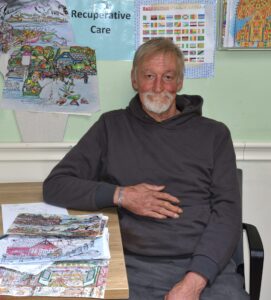Preble Street Hope House is one of only five privately operated adult low-barrier shelters in Maine and the only one north of Waterville. Hope House, located in Bangor, Maine, is the first 24/7, 365 day a year Preble Street program outside of Portland and joins Preble Street’s Veterans Housing and Anti-Trafficking Services in providing services in Penobscot County.
Low-barrier shelters do not require background checks, credit checks, or income verification, previous program participation, sobriety, or ID for access to services. Low-barrier shelters provide services to people experiencing mental or behavioral health challenges and/or substance use disorders – they are the first place that people can go to begin the process of recovering from homelessness.
High-quality professionally run shelters, like Preble Street Hope House, provide more than just a place to sleep for a night. They provide staff who are trained in trauma-informed care and harm reduction, housing navigation services, case management, healthy and nutritious meals, and more. Shelters also divert the most vulnerable from relying on the most expensive services like hospital emergency rooms, jails, police, emergency response systems, and the child welfare system.
Preble Street Hope House is a 56-bed low-barrier shelter
Preble Street assumed operations of Hope House on Sunday, February 2, 2025, from Penobscot Community Health Center (PCHC). In fall 2023, PCHC had announced that due to financial considerations, it would close Hope House – its low-barrier 56-bed emergency shelter in Bangor – in fall 2024 unless another provider could take over operations.
Preble Street takes over the operations of Hope House while recognizing that low-barrier shelters in Maine face a growing yearly budget deficit. Serving as the ‘emergency room’ in the shelter-to-housing continuum, low-barrier shelters are directly on the frontlines of Maine’s opioid crisis. On April 22, 2024, Governor Janet Mills signed the supplemental budget into law, which included three years of $2.5M in annual funding — a total of $7.5M — to directly support low-barrier emergency shelters. Thanks to this support from Governor Mills and the Maine Legislature, Preble Street feels confident about managing the funding gaps for Hope House through 2027, ensuring that this shelter will remain open and staffed for vulnerable Mainers in need of shelter.
Preble Street is excited to become a bigger part of the Bangor community and will continue to fill in the budget gaps with the private support from community members and other funders that help us keep the doors open.
Maine needs to continue prioritizing sustainable, permanent funding revenue for our critically important low-barrier shelters to ensure that funding challenges do not impact the operations of Hope House – or any other Maine shelter.
Your support helps helps Preble Street provide shelter, stability, food, and hope for vulnerable Mainers!
Contact
Preble Street Hope House
179 Corporate Drive,
Bangor, ME 04401
Ph: 207-217-6713
If you have in-kind donations for Hope House, please call or email for more information. Thank you!
Read more

Preble Street testimony in support of permanent, sustainable funding for Maine emergency shelters
Maine needs and deserves safe, accessible, professionally run, and sustainable emergency shelters that can meet the needs of the growing number of individuals and families experiencing homelessness in our state. On Tuesday, February 10, 2026, shelter executive directors and staff from across the state went to Augusta to advocate for a sustainable funding source that

Federal attacks on people in poverty
Instead of providing solutions to hunger, homelessness, and poverty, an onslaught of recent federal actions and policies are attacking the people suffering from these challenges. The massive cuts to food assistance (SNAP), Medicaid, and homeless prevention and housing programs are harming thousands of Mainers, including older adults, people with disabilities, Veterans, families, homeless youth and

Brian’s Story
Sitting at a table at the Recuperative Care Program (RCP), Brian lays out pages of his art. “I’m working on making a children’s coloring book,” he says. Most of the pieces he has laid out are of captivating coastal scenes featuring birds, boats, and buoys. The longer you look at each page, the more you’ll